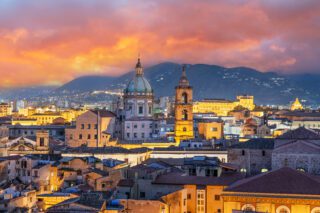 If you’re planning to retire in Italy, you’re certainly in for a treat. With its stunning landscapes, rich culture, and slower pace of life, the charming Mediterranean country offers an ideal setting for those seeking to enjoy their golden years.
If you’re planning to retire in Italy, you’re certainly in for a treat. With its stunning landscapes, rich culture, and slower pace of life, the charming Mediterranean country offers an ideal setting for those seeking to enjoy their golden years.
Italy is also known for its tax incentives for foreign retirees, excellent healthcare system, and diverse lifestyle options, making it a popular choice for many expats. Not only that, but the country offers an elective residence visa, which allows foreign retirees to live there if they meet certain financial criteria.
If you’re ready to plan your Italian retirement, this article will walk you through the key aspects, including visa options, healthcare coverage, cost of living, and the best places to call home.

Find the Best Travel Insurance
- Compare multiple quotes and coverage options
- Work with an insurance expert at no additional cost
- Find the best plan for your needs and budget
What Are the Benefits of Retiring in Italy?
Italy is a dream retirement destination for immigrants and world travelers. It’s no wonder, given its balmy Mediterranean climate, charming historic cities, and reputation for some of the best food in the world. But retiring in Italy can also be a wise financial move.
The Italian government has created tax incentives to encourage more foreign retirees to move to Italy. Those incentives include flat tax rates and exemptions on reporting overseas assets.
To qualify, you must meet the country’s eligibility requirements. Learn more about Italy’s tax incentives for foreign retirees under the “Do Expats Pay Taxes in Italy?” section of this article.
Of course, tax benefits aren’t the only reason to retire in Italy. Older immigrants can rest easy knowing that the country’s healthcare system is among some of the best in the world. Italy is also a centrally located European country, which is great news for world travelers who are eager to take weekend trips to other countries in Europe by car, train, bus, or plane.
How Much Does It Cost to Retire in Italy?
Before you retire in Italy, you’ll need to do some financial planning to decide if your budget can cover the cost of living. Italy does not allow retirees to work. Make sure you have a steady passive income before you arrive in the country.
Below is an overview of how much money you’ll need to retire in Italy, as well as the average costs you can expect to pay while living there.
Italy Does Not Allow Retirees to Work for a Living
Since Italy forbids retirees from working, foreign retirees must be able to comfortably support themselves without a job upon their arrival. Italian law states that retired immigrants must earn a passive income of at least €31,000 per year.
You must provide an official letter from your bank or the last two years of your income tax returns to prove that you have a stable and passive retirement income. These funds can come from social security, a pension, or a property or investment fund.
As you plan for your living expenses during retirement, here are some costs to consider. All cost of living data provided below comes from Numbeo. These figures, which are based on United States Dollars (USD), are up to date as of April 2024.
Housing and Utilities
Italy’s housing and utility costs can vary but tend to be more expensive in high-population areas. By choosing to avoid cities that are popular tourist destinations, you can avoid some of the country’s highest rental and real estate prices.
Major cities like Milan and Rome have the most expensive rental rates. However, big cities can offer luxuries and amenities that may not be available in smaller cities and towns.
A one-bedroom apartment located in the city center of a major Italian city costs an average of $924 a month. One-bedroom apartments in smaller cities cost an average of $693.
Overall, basic utilities for electricity, heating, cooling, and water cost a combined total monthly average of $242 countrywide. Internet costs an average of $33 a month, and mobile phone service costs an average of $15 a month.
Get our monthly newsletter filled with tips and information for people living, moving, and traveling outside of their home country.* *By submitting your email, you agree to receive monthly updates for expats, digital nomads, retirees, and more.
Groceries
Italy is known for its incredible food and wine. If you decide to retire in Italy, not only will you enjoy some of the best cuisine in the world, but you’ll find that the cost of groceries is friendly for most budgets.
Imported food items can be pricey, but staple groceries are relatively affordable. Here’s a closer look at the cost of food staples in Italy.
- Milk: $1.75 a liter
- Eggs: $4.18 a dozen
- Bread: $2.42 a loaf
- Rice: $3.19 a kilogram
- Chicken breasts: $12.87 a kilogram
- Apples: $2.42 a kilogram
- Bottled water: $0.55 per 1.5 liter bottle
Compare these prices with what you’re currently paying in your home country to get an idea of how much more — or less — you’ll spend on groceries if you retire in Italy.
Read About: The Cost of Living in Italy for Expats
Does Italy Offer Retirement Visas?
 Italy is one of the few countries in the world that offers retirement visas. However, their “retirement” visa — also known as the elective residence visa — can be used for reasons other than retirement.
Italy is one of the few countries in the world that offers retirement visas. However, their “retirement” visa — also known as the elective residence visa — can be used for reasons other than retirement.
Anyone who wants to live in Italy and makes enough passive income to avoid working can apply for an elective residence visa.
It’s important to note that this visa disqualifies you from getting an Italian work authorization permit. You can volunteer, but you cannot actively work to earn your income. Foreigners who want to get a part-time job during their retirement should look into work visas and work permits in Italy instead of using the elective residence visa to immigrate.
One benefit of applying for Italy’s elective residence visa is that it’s one of the easier paths to getting permanent residency, Italian citizenship, or even dual citizenship. Once you’ve applied for a visa and arrived in Italy, you’ll need to submit a request to the local Italian consulate or municipal center to get an Italian residence permit. Immigrants who are not citizens of the European Union (EU) or European Economic Area (EEA) must apply for an Italian residence permit if they intend to stay in the country for longer than 90 days.
Requirements for the Elective Residence (Retirement) Visa:
The key to qualifying for the Italian elective residence visa is to provide proof that you have a stable passive income.
By law, Italy requires elective residents and retirees to have a passive annual income of €31,000 if they’re single or €38,000 if they’re married. If they will be moving to Italy with young children or other dependents, each dependent raises the minimum passive income by 20%. This income can come from savings, investments, or pensions but cannot come from actively working a job.
You’ll also need a valid passport and proof that you’re either leasing a rental property or have purchased a property in Italy. Other necessary documents include a complete Italian long-stay visa application form, a birth certificate, a marriage certificate (if applicable), and a clean background check. You must provide bank statements and reference letters from your banking institution or a chartered accountant that document your finances and bank funds from the last six months.
Once you submit your visa application, it takes about 90 days to be approved and receive your elective residence visa.
Read More: Moving to Italy
What Options for Health Insurance Are Available for Retired Expats in Italy?
Retirement planning includes making sure you have enough coverage for your healthcare needs. Foreign retirees in Italy have a few different options for health insurance.
If you’re a citizen of the EU or EEA who has a European Health Insurance Card (EHIC), you can use your EHIC card to cover your medical expenses while living in Italy.
Citizens of other countries don’t have this option. But whether you’re from a country in the EU or EEA, or somewhere else, you still have the option to carry private health insurance or rely on Italy’s public health insurance program.
Italy’s healthcare system has great patient outcomes, but the country’s publicly funded insurance program comes with limitations. These limitations can impact your access to certain doctors and timely care. Many immigrants and retired expats purchase an international private health insurance plan to cover expenses that Italy’s public health insurance does not cover.
Here’s a closer look at how health insurance works for foreign retirees in Italy. We also explain how a private health insurance plan can benefit expats and immigrants.
Recommended Health Insurance Plans

IMG Global Medical Plan
- Four plan options and plus optional coverages
- Choice of the coverage areas and deductibles
- Freedom to choose your health care provider
How Italy’s Public Health Insurance Program Works
Italy founded its universal healthcare system, the Servizio Sanitario Nazionale (SSN), in December 1978. The SSN covers the cost of standard medical treatments and services to Italian citizens and legal foreign residents. While many key medical services are free under the public system, the downside is that the quality and availability of health services can vary across Italy’s regions.
Each Italian province is responsible for funding and overseeing its local healthcare program. That means the medical care you receive in Florence, which is located in the Italian region of Tuscany, may differ in quality from the care you receive while living in a city within the Abruzzo region.
Because Italy doesn’t have enough medical facilities to cover the demand for care, patients who use the country’s public healthcare services are more likely to face large crowds and long wait times at facilities. For this reason, some doctors take their patients on a first-come-first-serve basis rather than by appointment.
Foreigners must register with their local Italian health authority when they immigrate. During your registration, you’ll be asked to choose a doctor or general practitioner. The doctor you choose will be the only doctor from whom you can receive treatment under the public system unless the doctor refers you to another physician or a specialist.
Recommended Health Insurance Plans for US Citizens

Xplorer Worldwide Medical Plan
- Premium Benefits, Coverage and Service
- Define your deductible and prescription benefits
- For Foreigners in the US or US Citizens Abroad
Benefits of Buying Private Health Insurance in Italy
Immigrants who purchase a private health insurance plan during their stay in Italy will have more freedom over the doctors they choose to see. Private health insurance also makes it easier to avoid long wait times and crowded facilities. For English-speaking foreign retirees, a private plan can provide better access to facilities where the doctors and staff speak their language.
The Italian healthcare system has strong patient outcomes, but there are some gaps. A private international medical insurance plan can address those gaps and give you peace of mind during your retirement years.
Do Expats Pay Taxes in Italy?
 Both citizens and non-citizen residents of Italy are required to pay taxes to the Italian tax authority. However, the Italian government passed a new flat tax in 2022 — part of an effort to make the country more attractive to retirees.
Both citizens and non-citizen residents of Italy are required to pay taxes to the Italian tax authority. However, the Italian government passed a new flat tax in 2022 — part of an effort to make the country more attractive to retirees.
If you retire and switch your tax residence to one of the qualifying municipalities in southern Italy, specifically, you can claim a flat 7% tax rate on any foreign income, including pensions, dividends, capital gains, and income earned from property rental payments. Qualifying municipalities in southern Italy include Sicily, Calabria, Sardinia, Campania, Basilicata, Abruzzo, Molise, and Puglia. Your home country must also share a tax treaty arrangement with Italy.
If you don’t qualify for Italy’s 7% flat tax incentive, you will file your taxes the same way as Italian citizens. That means your pension income will be considered personal income, and you’ll be taxed on your investments and savings.
Income from Italian banks and financial institutions is automatically taxed through withholdings. Passive financial income, like capital gains and interest earned abroad, must be disclosed in your tax return. Capital gains and wealth taxes in Italy are typically around 26%.
For advice about your specific tax needs, consult a financial accountant who specializes in international taxes.
What Are the Best Places to Retire in Italy?
As you consider whether retiring in Italy is right for you, you might wonder how you can enjoy a great quality of life while staying within budget.
Some Italian cities and towns offer greater affordability — and a better fit for your lifestyle — than others. But it’s not that difficult to find the perfect city if you do a little research.
To help get you started, here’s our list of the best places to retire in Italy.
Pescara
Located just east of Rome in the region of Abruzzo, Pescara features breathtaking landscapes and beautiful beaches along the Adriatic Sea.
Retiring in Pescara means you’ll be close to an abundance of outdoor activities, including olive oil and wine production, horseback riding, and hiking. It offers spacious real estate at better prices than what you’ll find in the big cities, ensuring close access to amenities but with plenty of privacy.
Turin
Turin’s gorgeous vistas have made it a popular choice for both digital nomads and retirees. The city has all the culture and ancient history for which Italy has become known, as well as great options for nightlife, shopping, and dining.
Retirees will appreciate Turin’s relaxed lifestyle. A stone’s throw from the Italian Alps, Turin is also conveniently located near some of the best skiing and hiking in the country.
Milan
Milan is Italy’s financial center and one of the fashion capitals of the world. If you’re seeking a luxurious city where you can enjoy a sophisticated lifestyle during retirement, Milan is the place to be.
As with all major cities, living costs are higher in Milan than they are in most Italian cities. The upside is that you’ll have access to top-quality healthcare, public services, and amenities, not to mention fascinating local Italian history and world-class fashion and art.
Tuscany (Region)
The sunny cities and villages of rural Tuscany have attracted international citizens for decades. Florence, Lucca, Pisa, and Siena are among Tuscany’s bigger cities but don’t overlook gems like Montepulciano (a hub of the Italian wine industry) or San Gimignano (known for medieval architecture).
Tuscany’s picture-perfect vineyards and rolling hills, as well as its low rate of crime, are just a few of the reasons behind its lasting popularity with foreigners and retirees.
Read More: The Safest Places to Live in Italy
Ready to Spend Your Golden Years in Italy?
Retiring in Italy offers an incredible blend of natural beauty, rich culture, and a slower pace of life that many dream of. With tax incentives, an attractive retirement visa program, and top-tier healthcare, Italy provides everything you need to enjoy your golden years in paradise.
Choosing the right city or town will depend on your personal preferences, lifestyle, and budget, but the opportunities are endless across this beautiful country.
Though Italy’s public healthcare system offers excellent care, it’s always a good idea to secure a private global health insurance plan before you move to the country. This will not only help you meet immigration requirements but also give you more freedom when selecting doctors and reduce wait times for medical services.
Start planning your retirement in Italy today and take the first step toward an exciting new chapter abroad.
